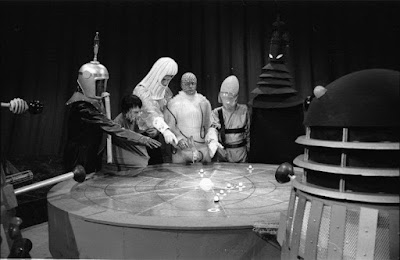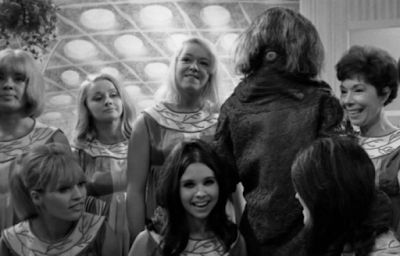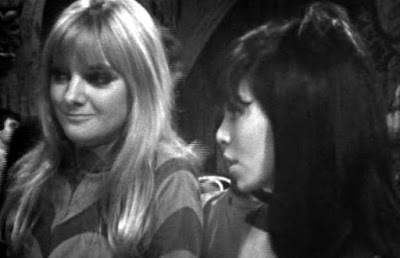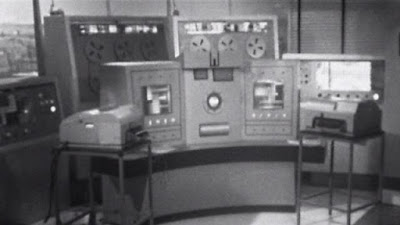Doctor Who's third series in 1965-1966 is in many ways its most interesting. It's also - frustratingly - the least represented in the archives, at least in terms of key visual material. Bold if aimless changes of direction, struggles to maintain a strong regular cast, desperation to cling on to the remnants of 'Dalekmania', and reputed behind-the-scenes high level clashes would all play their part in shaping this often overlooked set of episodes, but many of their most glaring manifestations were wiped before the sixties were even over and have never surfaced again. Unless they're in that tedious proverb-dispenser's coal scuttle, of course.
As it stands, we have no concrete idea of what some key scenes and costumes actually looked like, or even what some characters were actually called, but you can rest assured there'll be plenty more about that later. It also means that there's comparatively little of the series actually available to watch, and while the surviving audio recordings have really come into their own at this point, it's still going to make this instalment something of a challenge to write. And so, if you will, The Nightmare Begins...
The Drahvins Would Have Loved Twitter
Series Three's opening story Galaxy 4, one of the most overtly politicised Doctor Who stories ever, saw the Tardis crew caught up in a struggle between spaceshipwrecked factions of glam glittery-eyed statuesque blonde female-dominated race The Drahvins, and reclusive walrus-like scary-voiced bug eyed monsters The Rills, of whom every photo ever printed is apparently 'rare'. You can guess who turned out to be the real 'monsters' of the piece. Along the way, there is a good deal of strident-for-the-time debate about the pros and cons of a female-led society (not all of them entirely endorsed by Vicki), the effects of cloning on human behaviour, and the point at which equality becomes inequality - alongside, to be fair, mass frowning at the wishy-washy passive pacifism that The Rills claim makes them 'superior' - and the moral and ethical ramifications that these beliefs and values hold for The Drahvins' plan to get away from the unnamed planet. As their plan more or less involved slapping a Trigger Warning on the poor old Rills before setting up a Safe Space and then No-Platforming them into the middle of an exploding planet, they'd no doubt have jumped at the opportunity to indulge in a hashtag-fuelled argument about which of them was the best at having the plan. Meanwhile, it's probably best not to speculate on what Maaga's oft-referenced 'special things' might have been.
"Then There Was A Galaxy Accident"
Let's be honest about this, the entire history of Doctor Who right up to the present day is awash with jaw-droppingly jarring examples of simultaneously unscientific and ungrammatical dialogue. And it's not really the purpose of this series-by-series overview to point and laugh at deficiencies (unless it's The Anti-Matter Monster), but there's some that you just can't let pass. The Ark is not exactly a story known for its understated and naturalistic script exchanges - in fact, that bizarre bit with a Monoid smashing a vase threateningly, then throwing the flowers that were in it to the floor as if 'underlining' his point almost made this list in its own right - but one particular line elevates all of this to a virtual art form. It's all going swimmingly when The Doctor starts quizzing a friendly Refusian about why their planet is so keen to accept the incoming colonists, Human and Monoids alike, until he asks how the Refusians came to be invisible. This was, we are informed, due to a 'Galaxy Accident'. Oh, right, thanks. You can't help feeling that there were probably better explanations in Space School (BBC, 1956). The Ark was ostensibly written by Paul Erickson and Lesley Scott, although Erickson later alleged that Scott was simply credited out of courtesy and did not have any hands-on involvement in the scripts. Evidently not, as she might well have crossed that line out.
Katarina Could Actually Have Been Quite Good
Let's get this series' first major Elephant In The Room out of the way then. And not the actual elephant in The Ark. Given that even proper hardcore fan researchers are at stern-faced loggerheads over it, it's likely that the debate over whether short-stay regular cast members Sara and Katarina constitute proper 'companions' (or, as they were more accurately known at the time, 'assistants') will rage on for ever more. While I do have my own opinion on the matter based on the wider context of television at the time, I have no intention of turning this into a free-for-all scoff-festival, and so shall leave it there. Other than to say that certain magazines who snort at the idea of including them probably shouldn't pass out with excitement over someone who was in about two and a half recent episodes a couple of pages later. Anyway, the main argument made against poor old Katarina as a character - who for many years was only represented by less than a minute's worth of footage in which she essentially had no dialogue - was that she slowed down proceedings too much. Hailing from Ancient Troy, she was forever having to have anything and everything and indeed everyone explained to her, which quickly got on the production team's nerves, to the extent that Terry Nation simply noted her final scene in the script as 'SPEECH HERE TO COVER THE DEATH OF THE GIRL'. Then an episode featuring Katarina turned up, but everyone was too busy trying to work out which Delegate was which to notice that she actually seemed to have a lot more potential than anyone had quite reasonably assumed. Adrienne Hill gives a solid performance combining superstition and pre-scientific intellect with a combative nature and a reverential trust in The Doctor - almost like a faint evolutionary echo of Leela - and while she isn't used particularly well in that particular episode, it's easy to see how with a bit of time and work, that could have slotted into the show's dynamic to good and potentially comic effect. She'd certainly have ended up with a bit more to do than just twisting her ankle. Speaking of which, Sara was a properly badass independent woman who'd made her name in a man's world and showed more bravery and level-headedness in facing off against an entire Dalek army than The Doctor and Steven combined, so maybe she's worth 'allowing' on that basis alone? I mean, it's not like the vast majority of Doctor Who fans are huffy chauvinist blowhards or anything. And while we're on the subject of uppity female regular characters...
Are Dodo's Outfits Really That Ludicrous?
Gobby Mod Girl Dodo Chaplet joined the Tardis crew halfway through Series Three, but never really endeared herself to the viewers and was quietly written out at the end of the run. Since then, she hasn't exactly endeared herself to fans either, and comes in for a good deal of flak on account of her inconsistent accent, chipper street-smart attitude, ludicrously contrived backstory and somewhat 'of their time' fashion choices. In fairness she wasn't the best conceived or realised regular character in Doctor Who history, and there is probably something in all of these criticisms. Apart from the last one. Dodo, so we're told, was the ultimate Doctor Who fashion victim, sporting ludicrous getup that made Capable Caroline from Here We Go Round The Mulberry Bush look underdressed, and bore no relation to anything that anyone in the real world would ever have been spotted wearing. In the context of the High Street Fashion of the day (as opposed to everyday clothing), though, she wasn't too far off the mark. And in terms of the sort of Swinging London style explosion she was supposed to represent, absolutely bang on Mod Target. That pop art two-tone 'Crusader' tabard that she wears to much snigger-provokement in The Ark? Keep an eye on Roy Wood the next time BBC4 repeat that clip of The Move doing Fire Brigade on Top Of The Pops. The miniskirt, vest and cap combo covered in psychedelic circles in The Celestial Toymaker? Try finding a mid-sixties magazine shoot where a model isn't wearing something similar. Nehru Jacket/Plastic Mac hybrid in The Savages? Seriously, talk of the UFO Club right there. It probably would have gone down well in a similar if fictional club Dodo once visited, too. Other than that...
There Is A Distinct Lack Of 'Mods' In The Inferno Club
Right at the end of Series Three, there was a conscious attempt by incoming producer Innes Lloyd to 'reinvent' Doctor Who by shaking off the lingering air of Improving Children's Literature and give it a more contemporary and action-packed edge. This he managed in no uncertain terms with The War Machines, a story that combined cutting edge mass communication-related scientific concerns with getting out and about in 'Swinging London', a large part of which actually takes place within the Capital's hippest and most happening nightspot, The Inferno. Yet while it looks convincingly close to the sort of place that Georgie and her mates would have hung out at in Adam Adamant Lives!, and had the post-Georgie Fame pre-Syd's Floyd Hammond-Jazz grooves and trendy lingo spot on (though it's best not to dwell on that reveller that tells The Doctor "you look like that Disc Jockey!"), the actual clientele have somewhat less of an air of authenticity. Aside from the Op-Art patterns sported by new assistant Polly and Sharon Tandy-esque club hostess Kitty, and one alarmingly frugging extra with a dandy suit and Jeff Beck hairstyle, everyone else just looks as though they're sporting their Sunday Best and dancing at a Church Hall 'hop'. In effect, they look exactly like how you'd get one cool person in amongst a load of clean-cut youngsters with am-I-doing-this-right? expressions in the average sixties Top Of The Pops audience, which is 'authenticity' of a sort but almost certainly not what they were aiming for. Still, given recent revelations, it's a good job none of that mid-late sixties Top Of The Pops footage exists or anything...
Hey! That's The Name Of The Series!
Sorry, where were we? Oh right, yes... The War Machines is also notorious for a sequence in which snazzy big WAP-enabled computer WOTAN appears to suggest that The Doctor also goes by the somewhat more contentious monicker of 'Doctor Who'. This one throwaway line has caused more in the way of consternation, hair-splitting and 'thinkpieces' than pretty much any other in old-skool Doctor Who's entire twenty six year history. There are those who argue that it proves this is his full name after all, those who try and invent ludicrous He's Free Is Nelson Mandela-style conceits in order to posit that it's some form of mishearing of '(it is The) Doctor who is required' or similar, and at the most ridiculous extreme the ones that furiously declare that it means The War Machines isn't 'canon'. And this is one of those moments where you have to look at Doctor Who as Just Another TV Series. Nobody involved in The War Machines had any idea that anyone would even care about it after what they expected to be its one and only showing, they'd never exactly been averse to playing around with this before then ("Eh? Doctor Who? What's he talking about?"), and with several new people coming in on the production side it's hardly surprising that something like this should have slipped in under the radar. Honestly, you do have to wonder about the sort of person who gets exercised about what was 'meant' by something that probably predated even the merest suggestion that it might in fact 'mean' anything at all.
D/C? Or Not D/C? That Is The Question
So many question marks over the lost visuals of the last ten minutes of The Massacre alone. No way of knowing for certain which of The Delegates was which and precisely how many episodes each of them appeared in. Impossible to reliably determine whether those two cricket commentators actually appeared on screen or not. And yet there's nothing about those long-lost Series Three stories that provokes more in the way of humourless debate than the conflicting accounts of what one of them might actually have been called. Actually, yes there is - the same story's production code. Mission To The Unknown, a one-episode story made without the regular cast and as more or less a 'trailer' for the forthcoming twelve part The Daleks' Master Plan, was recorded in tandem with Galaxy 4, or in internal document-ese 'Story T', and was duly assigned the story code 'T/A'. At least that's what we all thought, until someone went poking around those selfsame internal documents and found that it was occasionally referred to as Dalek Cutaway, and that - shock horror - the production code had been occasionally scribbled as 'D/C'. Even to the untrained eye it should be obvious that these are a description and a bit of shorthand respectively, and as such could only be counted as the genuine article in a universe where Strange Matter, The Destructors, Enemy Within, Oh Y'Know That One With Chellak and The Final Three Part Story Does Not Have A Title As Yet are also considered official story titles. More to the point, Mission To The Unknown was explicitly stated as the story title by Radio Times, and T/A was used somewhat more soberingly on the release form for wiping the episode in the early seventies. And anyway, Dalek Cutaway sounds stupid. And now, if you'll excuse me, I really must get out more.
The Gunfighters Is Actually Really Good
Although 'conventional', 'fan' and 'wisdom' are not really words that have any meaning when placed next to each other, conventional fan wisdom has it that The Gunfighters is one of the single worst Doctor Who stories ever. It is, apparently, a hammily overplayed comedy short on actual laughs, woefully historically inaccurate, crammed full of time-filling ear-assaulting musical performances, and all in all the main reason why the production team stopped doing those 'pure' historical stories (as apparently it's a legal requirement to refer to them as) altogether. Except that when you actually watch the story, it turns out to be a rather fun stage farce-like bit of Wild West hokum, where the reluctant and dreadful musical turns are actually part of the storyline, the cast get the chance to play for laughs and seem to enjoy it, and there are subtle but effective hints of 'adult' behaviour thrown in for good measure (Dodo seems disconcertingly - if realistically - taken with drinking and gambling), and anyway, who cares about getting minor bits of Frontier Days folklore wrong in the series that gave us The Megabyte Modem? True, The Ballad Of The Last Chance Saloon does get a bit wearing after a while... but you can read more of my thoughts about The Gunfighters, and all of the other historicals too, in Well At Least It's Free.
The Feast Of Steven Is Also Actually (Possibly) Really Good
Conventional fan wisdom also has it that the episode that went out on 25th December 1965, featuring the regular cast sprinting through a series of panto runarounds in the middle of a grimly serious twelve part Dalek epic set in the far future, isn't actually the sort of thing that most BBC shows did for Christmas around that time but the product of some sort of momentary lapse of sanity and basically a Fourth Wall-breaking aberration that should not be considered alongside the 'proper' series. Although it's difficult to say for certain unless The Eleventh Day Of Christmas brings us Eleven Philip Morrises A-Film Can Waving, chances are that for much the same reasons as above, it was actually an enjoyable Fourth Wall-breaking bit of silliness; it certainly seems that way from the existing audio recording (although it would be a stretch to say it looks that way from the few surviving off-air photos). After all, it was written by Terry Nation, who'd had years of experience in radio comedy, and starred William Hartnell, who was in a number of top-rated TV and film comedies before he started going 'eh?' a lot, and why get so stony-faced about The Doctor addressing the audience directly? It's almost like it might just be, you know, a bit of entertainment or something. And again, you can find more of my thoughts about this episode and The Daleks' Master Plan in general in Well At Least It's Free. And I'll go on plugging it until we get all those episodes back.
Did The Savages Actually Exist?
There are plenty of Doctor Who stories that everyone forgets about - try recounting all of the post-2005 adventures in order if you don't believe me - but at least there's still some tangible evidence that they were actually made and broadcast. Poor old The Savages, however, is somewhat lacking in that area. Broadcast once between two stories that were at least memorable, albeit for wildly differing reasons, and wiped not long afterwards, The Savages had little about it that would have imprinted itself in anyone's memory. Nowadays it's only represented by some unremarkable Telesnaps that could have come from any story, a couple of seconds of blurry off-air cine film of Frederick Jaeger that could frankly just be from any old film he was in, and audio recordings that even people who have listened to them within the previous forty eight hours would struggle to tell you very much about. In fact, not only did I find I had nothing to say about it when preparing for this feature, I'd actually unknowingly left it off the original list of notes. Even some prominent and authoritative episode guides list various crew members as 'Unknown', and it's hard to shake the suspicion that it might actually just be a massive hoax, slipped into a list of sixties stories by some jolly prankster so long ago that everyone's just come to believe that they always knew it existed. Still, being unremarkable to the point of nothingness is still better than being Rings Of Akhaten. Oh hang on, we haven't had any of that They Like Big Butts And They Cannot Lie stuff this time, have we...?
Anyway, join us again next time for 'Can You Sew Cushions?', Krail and Krang singing Reet Petite, and whatever NXOZ might actually mean...













